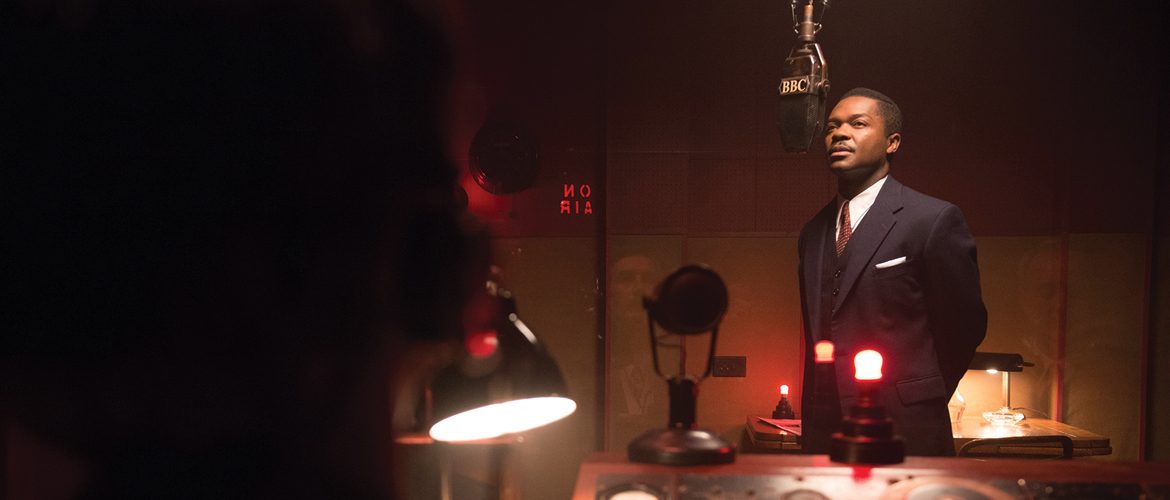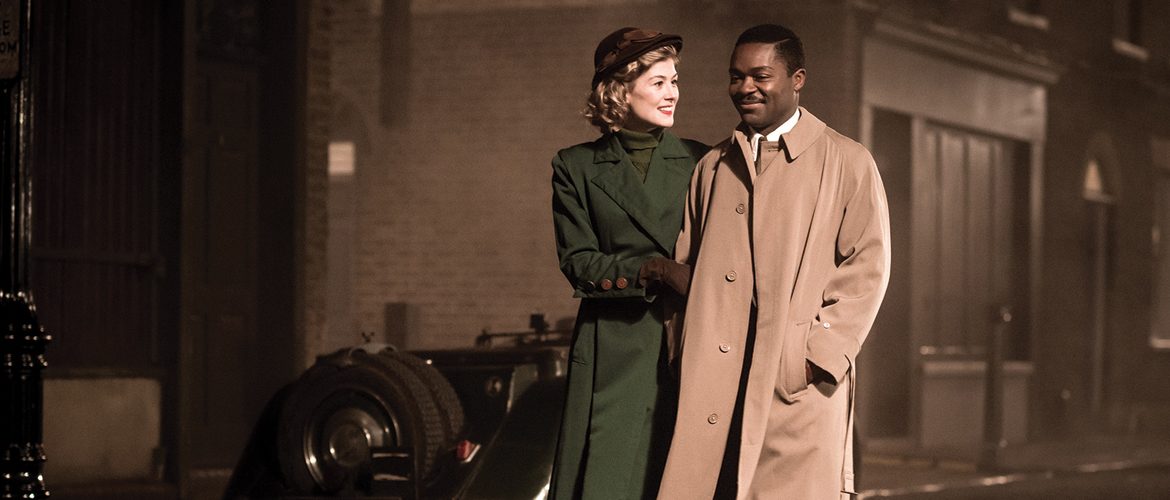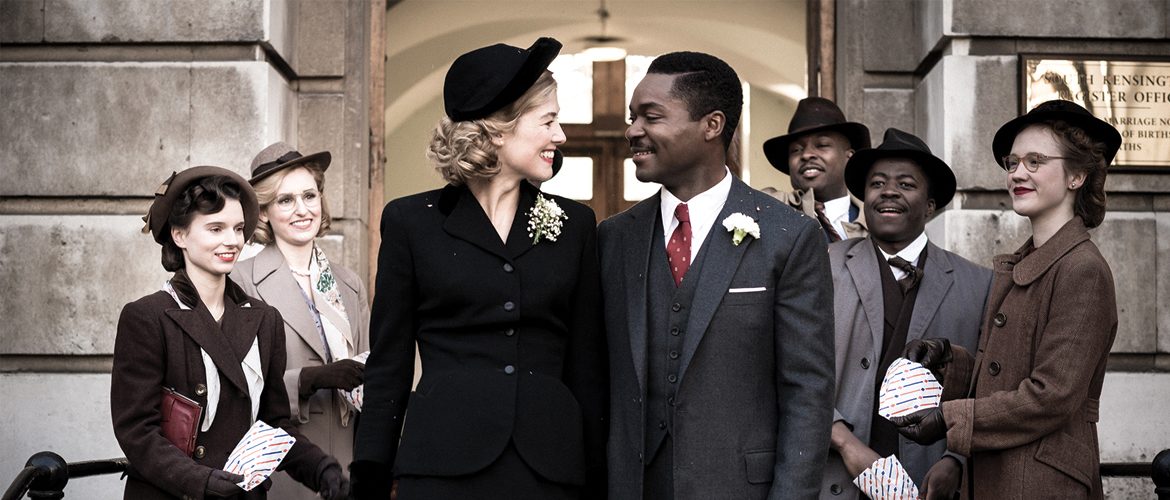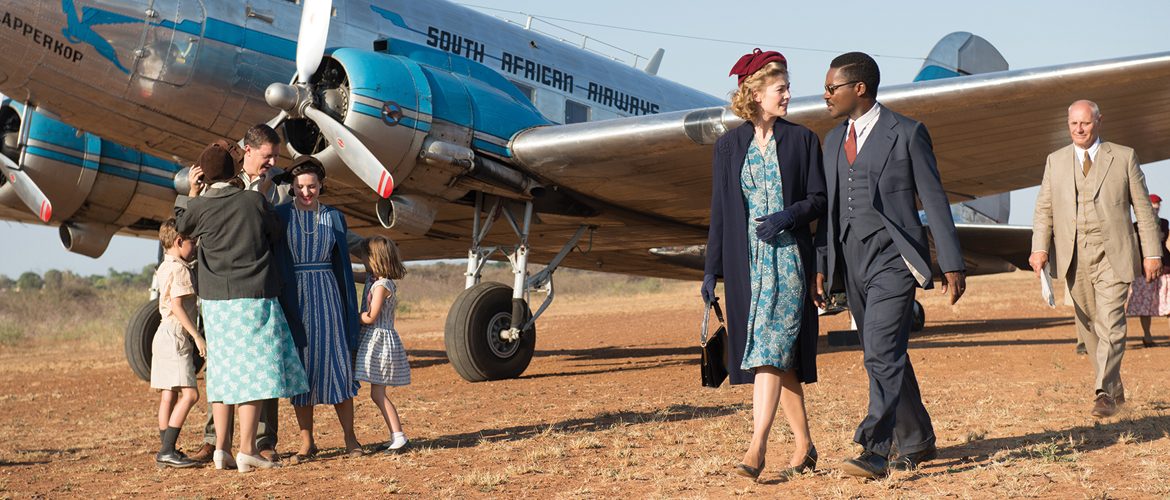A United Kingdom is a moving, fascinating, captivating David Oyelowo (Selma, Queen of Katwe, Captive) movie. This film, with David Oyelowo’s superb, multi-dimensional, multi-faceted, nuanced performance, is a significant movie for such a time as this. This movie is based on complex Christian, political, British and African history, which has important lessons for our time. It is a love story caught in political British and African history after WWII. David Oyelowo is one of the best actors of our times and his movies are critically valuable for such a time as this. This beautiful movie comes to select theaters February 10 and is perfect for a Valentine’s Day movie.
In 1947, Seretse Khama, a Prince of Bechuanaland (then a British protectorate), met Ruth Williams, a white woman from London who was an office worker at a missionary event. Their attraction was immediate. She was captivated by his vision for a better world. He was struck by her willingness to embrace it.
Seretse Khama of Botswana (David Oyelowo) and Ruth Williams (Rosamund Pike) were a perfect match, yet their proposed marriage was challenged not only by their families, but by the British and South African governments. In fact, at that time, the late 1940’s when apartheid was being introduced into South Africa, their marriage caused an international uproar. It was a decision that altered the course of African history with turmoil initially, but ultimately for much good. Despite the intense opposition they faced, Seretse and Ruth never wavered. They fought for their love every step of the way, and in so doing, changed their nation and inspired the world.
In the movie, A United Kingdom, the two meet in London in the late 1940s at a missionary society dance. They delight in each other’s company, as they bond over a shared love of jazz. They fall in love and he proposes marriage. However, they soon find themselves in the center of a conflict between nations which will change economic and political history far beyond the walls of the home they shared. They face down governments on two continents and Seretse Khama eventually leads Botswana to independence.
Khama is the son of the chief of the Bamangwato people in the British Protectorate of Bechuanaland, which later becomes Botswana under his leadership. It is his responsibility to return home to lead his people, after he completes his studies at Oxford.
Ruth Williams (later Lady Khama), has served as a WAAF ambulance driver at various airfields in the south of England during the Second World War and now works as a clerk for Cuthbert Heath, a firm of underwriters at Lloyd’s of London.
When Ruth meets Seretse while when he attending law school in England, he is the chief of the Bamangwato tribe, and he is destined to become Botswana’s first president in 1966. Under his leadership, the country underwent significant economic and social progress, while Ruth was a politically active and influential First Lady. However, first they had to overcome the wave of bigotry, due to their controversial marriage. When they announced the news of the marriage, in 1948, Ruth’s father threw her out of the house. Seretse’s regent uncle declared, “If he brings his white wife here, I will fight him to the death.” Further, the British government bent under pressure from apartheid South Africa, attempted to stop the marriage, and then prevented the couple from returning to Botswana.
Although the politics of their love story begins with discomfort over the fact of their different races, the stakes are elevated by South Africa’s ban on interracial marriage and the pressure on this neighboring country not to contradict its own apartheid policies. The interests of the British government also were at stake: British deep debts after World War II, British access to cheap South African gold, fears of the destabilizing effect their marriage might have in the colonies of its Empire, just to mention a few.
For eight years, Sereste and Ruth lived as exiles in England, until the Bamangwato sent a personal cable to the Queen in protest. Their sons Ian and Tshekedi also later became significant political figures in their country. The marriage is known to have inspired the film A Marriage of Inconvenience and the book, Colour Bar.
David Oyelowo became fascinated with the story after reading Susan Williams’ book “Colour Bar,” upon which the script for A United Kingdom would later be based. He urged director Amma Asante to sign onto the project. Asante was born in London. Her father’s homeland, the British colony, Gold Coast, become the independent nation of Ghana. Therefore, Asante was drawn to a story set in the context of an African nation gaining its independence.
A United Kingdom comes out in select American theaters on Feb. 10, after a successful run at last fall’s Toronto International Film Festival. Dr. Diane Howard exclusively interviews David Oyelowo for A United Kingdom.
DH: What was Seretse Khama’s family and national legacy from his father and grandfather, Khama the Great?
DO: Seretse’s father passed away when Serete was young. His grandfather had a strong influence on his life. His grandfather had “big shoes” for Seretse to fill. Seretse lived in the shadow of his grandfather’s greatness.
DH: Was Seretse’s grandfather a Christian?
DO: Yes, his grandfather was a Christian who was influenced by Christian missionaries.
DH: Who was Tshekedi Khama?
DO: He was Seretse’s uncle and the regent, who made life very difficult for Seretse.
DH: One of Seretse’s sons is named Tshekedi. Did Sereste and Tshekedi ultimately reconcile?
DO: Yes, they did eventually reconcile. Great Britain had meddled in their relationship. Bechuanaland, now Botswana, had been a British protectorate, since the times of Sereste’s grandfather, who wanted Great Britain to protect his country from South Africa. But Great Britain was disingenuous because they were more interested in own interests, especially mineral rights.
DH: Was Seretse a Christian man of faith?
DO: He was raised a Christian, but after he and Ruth were denied a Christian wedding, he became less vocal about the Christian faith. Ruth was a woman of faith.
DH: Why were Seretse and Ruth at the missionary dance (where they met)?
DO: Seretse was there because this was a place where African students in London gathered because they were welcome there.
DH: How did British Christians at that time complicate their relationship and desire to marry?
DO: They denied them a Christian wedding.
DH: How did Serete’s and Ruth’s marriage end up positively affecting Botswana?
DO: Serete became the first democratic president for his post-racial nation. It was not a racially divided country like South Africa on its border. Seretse’s post-racial attitude affected the post-racial attitude of Botswana, unlike the racially divided South Africa on its border.
DH: How did their lives affect other nations?
DO: Attitude can change nations. Sereste Khama inspired Nelson Mandela.
DH: How are Seretse and Ruth role models?
DO: They are inspiration for true love and spiritual connection. Their relationship was not based on lust or just attraction. They were lock step against the world.
DH: What lessons do we learn from Seretse and Ruth?
DO: This has basically been an untold story until now. This is partly because Great Britain acted disgracefully. We need to be careful not undervalue our own history.
DH: Your films are relevant to today. How is this movie timely?
DO: Today we live in great unrest often along racial lines that keep people apart and distrusting each other. This story demonstrates how a nation and nations can be brought together. This history exposes harmful prejudice on national and international levels and shows how we have more in common with each other than we have differences.
In the story of A United Kingdom and in the real-life history behind this movie, we see the power of love, endurance, and perseverance to overcome opposition and injustice. Governments and leaders of Great Britain and Bechuanaland at one point deemed Seretse to be unfit as king, due to his relationship with Ruth. (See real documentary footage on You Tube.)
Pressures and negotiations persisted about whether Seretse was fit to be king. The couple endured forced separations even when Seretse was alone in London, arguing his case with the British government, while Ruth was alone in Bechuanaland. However, they never wavered in their determination to live as man and wife in a country of their choosing. Ruth’s steadfast support of Seretse, in the face of overwhelming opposition to his rule, and her persistent efforts to engage with her new community, eventually won over the Bangwato people. Seretse’s strong stand and love for his people ultimately earned him the respect of both the British and his own people, and even of his uncle who had strongly opposed his marriage.
Eventually, Seretse transformed his nation, with Ruth at his side. He led it from being one of the poorest countries in the world to one of its more prosperous. It developed from a monarchy to a democracy. In 1966, Bechuanaland ultimately gained independence as the Republic of Botswana.
The power of Seretse’s and Ruth’s love and determination transformed their nation, which in turn lead to modern changes in Africa, inspiring the world. Seretse Khama was the first prime minister of Botswana, and from 1966 to his death in 1980, he served as the country’s first president.
The Christian history of Botswana is fascinating. Khama the Great, Sereste’s grandfather, was chief of the Ngwato people in the 19th century. He was a visionary leader and saw the need to protect his kingdom from the colonial carving-up of Africa. He therefore campaigned for the setting up of the British Protectorate of Bechuanaland (modern-day Botswana) in 1885. European missionaries arrived in numbers from around 1880. All major towns and villages in Botswana had one. Some chiefs rejected this outside influence, while others such as Khama the Great accepted them.
When Seretse married Ruth, Regent Tshekedi, Seretse’s uncle back in Bechuanaland, tried to disrupt the marriage, demanding that Seretse return home to have the marriage annulled. Seretse returned immediately and was sternly received by Tshekedi.
However, Seretse persisted, fighting back and hard to persuade the Bama-Ngwato people of his continued suitability as chief. On the 21st of June 1949 at a Kgotla (a meeting of the elders), he was declared Kgosi (king) and his new wife was warmly welcomed.
Seretse Khama returned to Great Britain to continue his law studies, however he was met with a Parliamentary investigation into his suitability for the chieftaincy. While Bechuanaland was under its protection, Britain claimed the right to ratify any succession. However, the investigation’s report for the government concluded that Seretse was “eminently fit to rule,” although this was suppressed for thirty years. In 1950, Seretse and Ruth were banished from Bechuanaland.
Nonetheless, under international pressure for the charge of racism, Great Britain decided to allow Seretse Khama and Ruth to return to Bechuanaland in 1956, if he and his uncle renounced their claim to the chieftaincy. Unexpectedly, political support had grown for Seretse during his six years of exile back in Bechuanaland and Seretse Khama was proclaimed a nationalist hero. In 1962 Seretse founded the Bechuanaland Democratic Party, campaigning for multi-racial reform. Seretse Khama’s strongly supported democratic self-government. He worked hard, for independence. In 1965 Seretse Khama was elected as Prime Minister. On the 30th of September, 1966, the country achieved independence and Seretse became the first president of the Republic of Botswana. He was re-elected twice and died in office in 1980.
He said, “We stand virtually alone in our belief that a non-racial society can work now, but there are those…who will be only too delighted to see our experiment fail.” He worked with the country’s various ethnic groups and traditional chiefs to create a strong, democratic government. During his rule, Botswana had the most rapidly growing economy of the world and the discovery of diamonds allowed the government to finance a new infrastructure. Further, the country’s second major export resource, beef, facilitated the development of wealthy entrepreneurs.
During his rule, Seretse Khama did not allow neighboring liberation movements to establish camps in Botswana, although he permitted transit to camps in Zambia, which resulted in raids from South Africa and Rhodesia. He helped to negotiate transition from the White minority rule in Rhodesia to the multi-racial rule in Zimbabwe. He was a key participant in the Southern African Development Co-ordination Conference (SADCC), launched in April 1980, shortly before his death.
Khama took strong measures against corruption. He adopted market-friendly policies to foster economic growth. He offered low and stable taxes to mining companies, liberalized trade, and increased personal freedoms. He kept income low to deter tax evasion and related corrupt practices. He strengthened liberal democracy, non-racism, and the rule of law. Public servants were hired on merit and the public bureaucracy was efficient and relatively free of corruption. Mining companies were encouraged to search the country for more resources, which lead to the discovery of additional copper, nickel, and coal. The government regularly renegotiated contracts with the mining companies, which provided good revenue for the country.
Sereste Khama said “Democracy, like a little plant, does not grow or develop on its own. If must be nursed and nurtured if it is to grow and flourish. It must be believed in and practiced if it is to be appreciated. And it must be fought for and defended if it is to survive.” The inscription on his grave stone reads, “The world is my church. To do good my religion.” Forty thousand people paid their last respects while his body lay in state. Twenty-eight years after Khama’s death, his son, Ian became the fourth President of Botswana. In the 2009 general election, he won a landslide victory, while a younger son, Tshekedi Khama II was elected as a parliamentarian. Today, Sir Seretse Khama International Airport is Botswana’s main airport.
The Republic of Botswana in southern Africa, once a British protectorate, is today an independent country with a stable democracy. It is also an economic success story with its rise from one of the poorest countries of the world to now hosting sound financial institutions with reinvestment of income from natural resources, including the riches of diamonds and other minerals.
The country also has a rich Christian missionary history. A 2015 story in All Africa.com states that the leadership of Botswana views religion (including Christianity) seriously as evidenced by the partnership that government enjoys with the religious organizations.
“Minister of Labor and Home Affairs, Mr. Edwin Batshu, told Parliament that the role played by the church in society was visible and much appreciated…and as examples, he cites their contribution to development of educational and health facilities, delivery of social services (such as care for vulnerable people), and the building of family and societal morals. And, as provision of the psycho-social support and nation building, the constitution of Botswana provided for the protection of freedom of conscience including freedom of religion. To date…1913 religious organizations have been registered and continue to enjoy this right…His Excellency, the President of Botswana, Lt. Gen Seretse Khama Ian Khama (first-born son and second child of Sir Seretse Khama ) continuously consults with faith-based organizations on matters of national interest. He convened a joint consultative meeting with representatives of the leadership and faith-based organizations to discuss issues of concern and of national interest. Specifically, they discussed the deteriorating morals among our people and promotion of tolerance among people of different religious beliefs and cultural values…” Thus, the legacy of Seretse Khama’s grandfather, Khama the Great, persists to this day.
Sereste’s and Ruth’s relationship also have had profound, positive influence on their own family and legacy. For example, Thalia Khama, their granddaughter, tells how her grandparents’ love for each other saved her life.
David Oyelowo has said, “I think that God doesn’t see colour…this absolutely chimes with my faith, in that I think Seretse Khama and Ruth were motivated by love and that love has a power that cut through governments, cultures, all kinds of resistance that your average person probably wouldn’t weather.”
David Oyelowo’s excellent, authentic, and honest movies are relevant and timely, providing solutions to many of today’s problems. His movies often picturize how to overcome opposition and evil with good. A United Kingdom and the story behind it present important lessons for our time.
By Diane Howard, Ph.D. (Performance Studies), dianehoward.com




